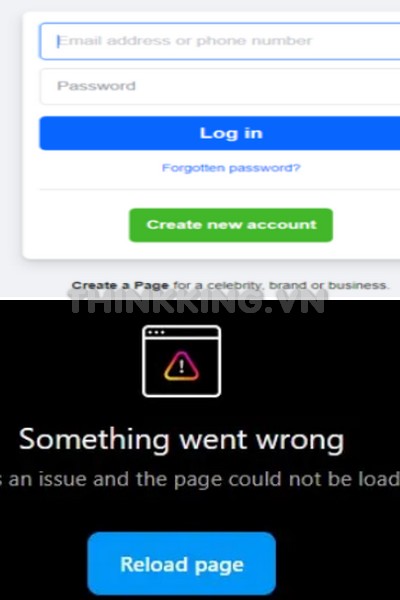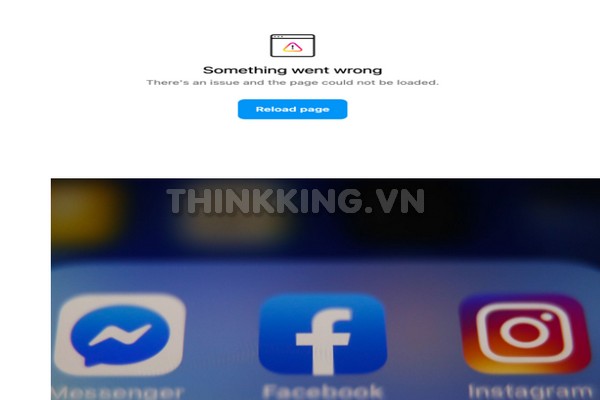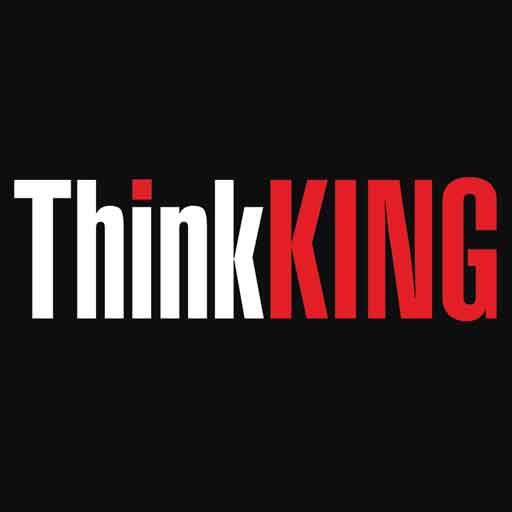Around 10am US Facebook Stopped Working on March 5, 2024: Session expired, Can’t log in, Log out
Imagine this: You wake up, pour yourself a cup of coffee, and sit down to scroll through Facebook for your morning dose of updates, news, and memes. But today, March 5th, 2024, is different. Your session has expired, and no matter how many times you try, you can’t log back in. The world’s most extensive social network, Facebook, has come to an abrupt halt, and so has Instagram. With billions of users worldwide left in the dark, questions arise, rumors spread, and the hunt for answers begins. Welcome to a day when the digital pulse stood still, a day we explore the intricacies of our dependence on social media and the dominos that fall when giants like Facebook stumble. Following Thinkking.vn.

I. Introduction: The Day Digital Stood Still
On March 5, 2024, the digital realm experienced a seismic disturbance as Facebook, the ubiquitous social media giant, suffered a colossal outage. Users worldwide were abruptly confronted with an unexpected challenge: session expiration, rendering them unable to log in, and ultimately, logged out of their accounts. This unprecedented disruption did not discriminate; it affected millions, creating a ripple effect that echoed globally. The outage extended its icy fingers beyond the core Facebook platform, ensnaring related services such as Messenger and games reliant on Facebook logins.
In the face of this digital blackout, users found themselves cast adrift in a sea of confusion and frustration. The abrupt severance from their online personas left them scrambling for answers and seeking solace on alternative platforms. Social media channels, like X (formerly Twitter), became virtual town squares where users congregated to share experiences and seek information about this extraordinary event.
As the hours ticked by, a collective sense of anxiety permeated the digital landscape. The outage not only underscored the interwoven fabric of modern lives with these platforms but also raised pressing questions about the reliability of digital infrastructures. With no official explanation from Facebook, speculation ran rampant, creating an atmosphere of uncertainty and prompting an exploration into the technical intricacies behind this unprecedented disruption. The day Facebook stood still became a testament to the fragility of our digitally dependent existence and the need for a deeper understanding of the digital ecosystems we inhabit.
Fix by Facebook :
https://www.facebook.com/login/device-based/regular
II. The Global Impact of the Outage
The outage on March 5, 2024, wasn’t confined to a specific region; it was a global phenomenon with Meta, the parent company of Facebook, facing a comprehensive outage. Facebook and Instagram, the two behemoths in the social media landscape, experienced a simultaneous disruption, leaving users worldwide in digital darkness. This Meta outage was not just a glitch; it was a widespread outage affecting users on a global scale, emphasizing the interconnectedness of these platforms that billions rely on for communication, information, and social interaction.
Social media platforms, usually bustling with activity, suddenly echoed with the collective frustration of users grappling with the outage. Reports flooded in from various corners of the globe, illustrating the extent of the impact on Meta’s infrastructure. The outage didn’t discriminate; users in the United States, Europe, Asia, and beyond found themselves in the same boat, unable to access their Facebook and Instagram accounts.
As the outage persisted, users sought refuge on alternative social media platforms, emphasizing the adaptability and resilience of the digital community. X, Twitter, and other platforms witnessed a surge in activity as displaced Facebook and Instagram users flocked to share their experiences and seek solace in the virtual realm. This global disruption underscored the significance of these platforms in our daily lives and prompted users to explore alternative avenues for social connection during the outage. The day Facebook and Instagram went dark was not just a local incident; it was a global event that highlighted the profound impact of social media outages on a planetary scale.
III. Technical Aspects and Potential Causes
1. Investigating the Blackout: Cybersecurity Insights
As the digital landscape reeled from the March 5, 2024 outage, cybersecurity experts and technology analysts swiftly mobilized to unravel the mystery behind the blackout. Reports of login errors flooded in from users globally, prompting an urgent need to understand the technical intricacies at play. Cybersecurity professionals embarked on a meticulous investigation, scrutinizing the digital fingerprints left by the outage.
The blackout raised questions about the vulnerability of Facebook’s cybersecurity measures. Analysts delved into potential causes, exploring scenarios that ranged from hardware failures to software glitches and even the specter of malicious cyber attacks. The urgency to restore service was accompanied by a parallel mission: to identify weaknesses in Facebook’s systems, network infrastructure, and security protocols.
2. Facebook’s Infrastructure: A Question of Resilience
The outage compelled a critical examination of Facebook’s infrastructure resilience. The sheer scale of the disruption prompted questions about the adequacy of backup systems, failover mechanisms, and disaster recovery plans in place. Cybersecurity experts scrutinized the layers of Facebook’s digital fortress to understand where the breach occurred and how future incidents could be mitigated.
The investigation extended beyond mere troubleshooting; it sought to fortify the foundations upon which Facebook’s digital empire rested. Analyses of network redundancies and potential single points of failure were conducted to ensure a more robust and resilient system capable of withstanding unforeseen disruptions.
3. Facebook session expired: Why did Facebook log you out?
Among the multitude of issues stemming from the outage, the perplexing phenomenon of session expirations left users with more questions than answers. Without a comprehensive explanation from Facebook, users speculated about the root cause behind the abrupt logouts. Cybersecurity experts and analysts examined potential glitches in the session management system, exploring scenarios where the intricate dance between user sessions and server protocols faltered.
The investigation aimed not only to resolve the immediate user inconvenience but also to establish preventive measures against future session-related disruptions. Understanding why Facebook sessions expired became paramount to restoring user trust and preventing similar incidents in the digital future.

IV. Consequences of the Facebook Outage
1. Data Privacy Concerns: User Trust on the Line
The outage on March 5, 2024, reverberated far beyond inconvenience, giving rise to profound concerns about data privacy. Users increasingly rely on social media platforms to store personal information, photos, and communication records. With Facebook and Instagram inaccessible, questions emerged about the security and trustworthiness of these services in safeguarding user data. The abrupt disruption underscored the vulnerability of centralized platforms, prompting users to reevaluate their trust in major tech companies and fueling discussions about the necessity for more decentralized and secure alternatives.
2. Communication Breakdown: The Social Ramifications
Beyond personal data concerns, the outage triggered a communication breakdown with significant societal ramifications. As users scrambled to reconnect with friends, family, and colleagues, the outage highlighted the extent to which modern communication heavily depends on these platforms. Businesses, organizations, and individuals engaged in marketing, customer service, and community outreach found themselves stranded without their primary channels. The incident laid bare the fragility of our digital dependencies, prompting a collective reevaluation of contingency plans and alternative means of communication in an increasingly interconnected world.
3. Was Facebook down on Super Tuesday? Users reported outages on primary election day
The outage coincided with Super Tuesday, a crucial day for primary elections, adding a layer of complexity to its consequences. Users reported difficulties accessing Facebook during this pivotal political event, raising concerns about the potential impact on voter engagement, information dissemination, and political discourse. The outage on a day of significant democratic importance underscored the societal reliance on these platforms for real-time updates and interactions. The incident prompted a closer examination of the intersection between social media, civic engagement, and the potential consequences of digital disruptions on critical events.
V. Recovery and Responses
1. Meta’s Facebook, Instagram back up after global outage
In the aftermath of the unprecedented outage, Meta, the parent company of Facebook, embarked on swift and decisive measures to restore access to its platforms. Users globally anxiously awaited updates, and Meta responded by diligently addressing the technical issues that led to the outage. Meta’s commitment to resolving the disruption was reflected in the gradual restoration of Facebook and Instagram services, marking the end of a digital blackout that had left billions in the dark.
2. Meta Says Access Is Restored After Facebook and Instagram Outage
Meta, cognizant of the widespread impact, promptly communicated with its user base, assuring them that access was restored after the outage. The company’s transparency, though limited, aimed to provide users with a semblance of clarity and confidence in the platform’s recovery. Acknowledging the inconvenience caused, Meta’s communication underscored their commitment to resolving technical issues efficiently and minimizing disruption to user experiences.
3. Facebook is back! DownDetector shows most users regaining access to the social media platform
As Meta diligently worked towards a full recovery, external monitoring services like DownDetector reflected positive trends. Reports indicated that most users were regaining access to the social media platform, marking a pivotal moment in the aftermath of the outage. The collective sigh of relief echoed across digital platforms as users celebrated the restoration of their digital connections. The dynamic nature of the recovery process was captured by real-time data, providing a reassuring narrative of progress and the gradual return to normalcy.
4. Is Facebook still down? When will FB, Instagram be fixed? Users start regaining access
The lingering questions about the duration of the outage and the timeline for full restoration echoed through user communities. While some users reported regaining access, others still grappled with technical glitches. Meta faced the ongoing challenge of disseminating timely and accurate information to manage user expectations. This phase of recovery and responses became a critical juncture, requiring Meta’s continued engagement with users and a commitment to resolving residual issues to ensure a seamless return to normalcy.
VI. Facebook’s Pledge Against Deepfakes
1. Tech Giants Unite: A Fight for Election Integrity
In the wake of the March 5, 2024 outage, Facebook, alongside other tech giants, pledged to address a pressing concern—artificial intelligence-generated deepfakes. The commitment emerged under mounting pressure from the White House to safeguard the integrity of major democratic elections in the U.S. and overseas. Recognizing the potential threat posed by deepfakes, Meta-owned Facebook took a stand to ensure the authenticity of information circulating on its platform.
2. Facebook joins tech giants in pledging to crackdown in AI deepfakes for 2024 Election
Building on its commitment to election integrity, Facebook joined forces with other prominent tech companies to crackdown on artificial intelligence-generated deepfakes. The collaborative effort aimed to create a united front against the dissemination of manipulated content that could undermine the democratic process. This alliance signaled a pivotal moment in the tech industry’s acknowledgment of the responsibility to combat misinformation and preserve the sanctity of elections.
3. Facebook and Instagram back up after global outage – The aftermath of the outage
The outage on March 5, 2024, not only prompted recovery efforts but also galvanized Meta, the parent company of Facebook, to proactively engage in securing the digital landscape against potential threats. The commitment to address deepfakes stood as a testament to the platform’s dedication to evolving security measures and enhancing user trust. As Facebook and Instagram resumed normal operations, the tech industry witnessed a united front in the ongoing battle for election integrity and against the proliferation of AI-generated deepfakes.
VII. Looking Ahead: Lessons Learned from the Outage
1. Strengthening Digital Infrastructure
The March 5, 2024 outage served as a wake-up call for the tech industry, urging a critical examination of digital infrastructure. In the aftermath of the disruption, a collective effort emerged to strengthen the resilience of digital platforms. Tech companies, including Meta, initiated comprehensive reviews of their infrastructure, focusing on enhancing redundancies, fortifying security protocols, and implementing robust backup systems. The outage underscored the imperative for continuous investment in digital infrastructure to minimize the impact of potential future disruptions.
2. Policy and Regulation: The Digital Markets Act
The outage triggered discussions about the need for comprehensive policies and regulations to govern the digital landscape. The European Union’s Digital Markets Act gained prominence as a potential framework to address issues of competition, data privacy, and the reliability of digital services. Policymakers and industry stakeholders engaged in dialogues to explore regulatory measures that could ensure the accountability and transparency of tech companies. The outage acted as a catalyst for reevaluating the existing regulatory landscape and inspired conversations about shaping a more resilient and user-centric digital future.
3. The Future of Social Media: A Diversified Landscape
As users grappled with the consequences of the outage, conversations emerged about the future of social media. The incident prompted a reevaluation of the digital ecosystem, with discussions centered around diversification and decentralization. Users and industry experts explored alternatives to the dominant players, envisioning a landscape where multiple platforms coexist, each serving unique user needs. The outage sparked a collective realization that a more diversified social media environment could mitigate the societal impact of disruptions, fostering innovation and competition within the digital space.
The lessons learned from the outage provided a roadmap for shaping a more resilient, regulated, and diversified digital future, challenging industry stakeholders to prioritize user trust, privacy, and the overall stability of the online ecosystem.
VIII. Conclusion: Navigating a World Where Digital is Integral
1. Reflecting on the Societal Reliance on Social Media
The March 5, 2024 outage served as a poignant reminder of the profound impact social media has on our interconnected world. The abrupt disruption not only highlighted the extent of global dependence on platforms like Facebook but also unveiled the fragility of these digital threads that weave through the fabric of our daily lives. As users reflect on the outage, a collective realization dawns about the intricate role social media plays in shaping modern communication, community building, and information dissemination.
2. The Importance of Proactive Measures and User Education
In the aftermath of the outage, the importance of proactive measures and user education became evident. Tech companies, users, and regulators alike found themselves at a crossroads, compelled to adopt proactive strategies for fortifying digital infrastructure, enhancing cybersecurity, and fostering user awareness. The outage underscored the need for continuous education on digital hygiene, security best practices, and contingency planning to empower users in navigating the complexities of the digital landscape.
3. Embracing Change and the Evolution of Digital Platforms
The outage marked a pivotal moment in the evolution of digital platforms, prompting a collective introspection into the dynamics of change. Users, businesses, and tech companies are challenged to embrace a future where disruptions are not anomalies but potentialities. As the digital landscape undergoes constant evolution, the outage encouraged a paradigm shift in the way stakeholders approach innovation, adaptability, and resilience. Embracing change becomes not just a necessity but a guiding principle for navigating a world where digital integration is integral to the human experience.
In conclusion, the events of March 5, 2024, beckon us to acknowledge the symbiotic relationship between society and digital platforms. As we navigate the ever-evolving landscape, the lessons learned from the outage become a compass, guiding us towards a future where digital connectivity is robust, secure, and harmoniously integrated into the fabric of our lives.
IX. Frequently Asked Questions (FAQs)
1. Why did Facebook log me out?
The sudden logout experienced by users during the March 5, 2024 outage was a result of a technical issue within Facebook’s infrastructure. The specific details of the incident are still under investigation, and Facebook has yet to provide a comprehensive explanation for the unexpected session expirations.
2. When will Facebook and Instagram be fully operational again?
The restoration of full functionality to Facebook and Instagram has been an ongoing process. Users began regaining access around 11:45 a.m. ET on the day of the outage, and gradual improvements have been observed. However, the exact timeline for complete restoration may vary, and Meta, the parent company of Facebook, is actively working to address any remaining issues.
3. Could this outage have been a cyber attack?
While the possibility of a cyber attack has not been ruled out, there is currently no specific evidence to suggest malicious activity as the cause of the outage. Investigations into the technical aspects and potential causes are ongoing, and Meta has not provided conclusive information regarding the nature of the disruption.
4. What should I do if I still can’t access my account?
If you continue to experience difficulty accessing your Facebook account, it is advisable to wait patiently as services stabilize. Keep an eye on official updates from Meta for any specific instructions or guidance. Meta’s ongoing efforts aim to address individual user concerns and ensure a seamless return to normalcy.
5. How can I protect my data during such outages?
To enhance the protection of your data during outages, consider implementing strong passwords, enabling two-factor authentication for an additional layer of security, and regularly updating your account recovery information. Additionally, it is recommended to back up essential data independently of social media platforms to ensure its safety and accessibility.










